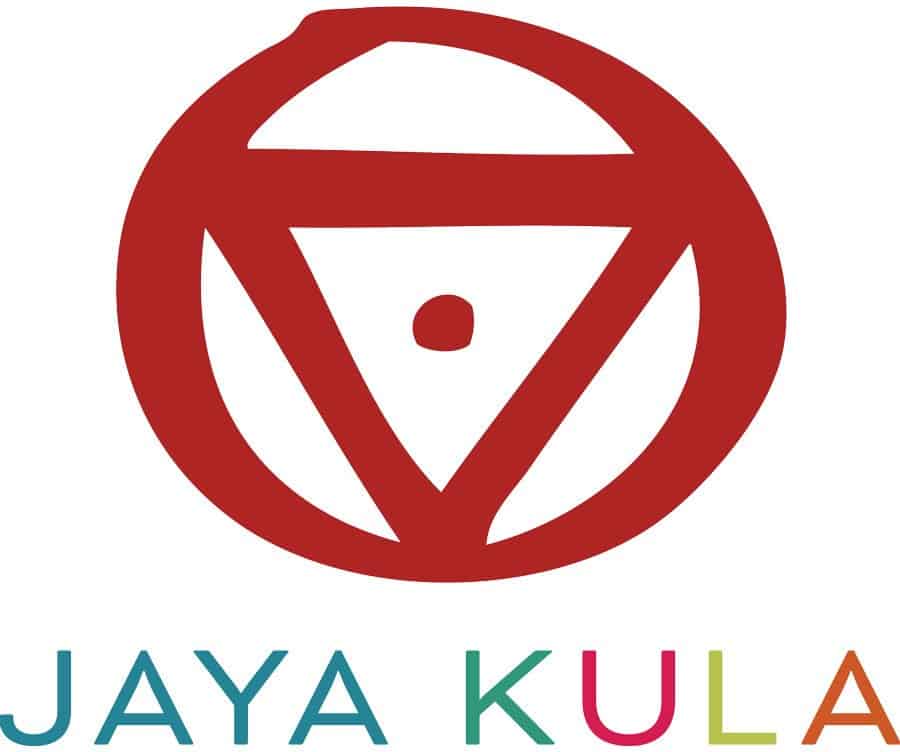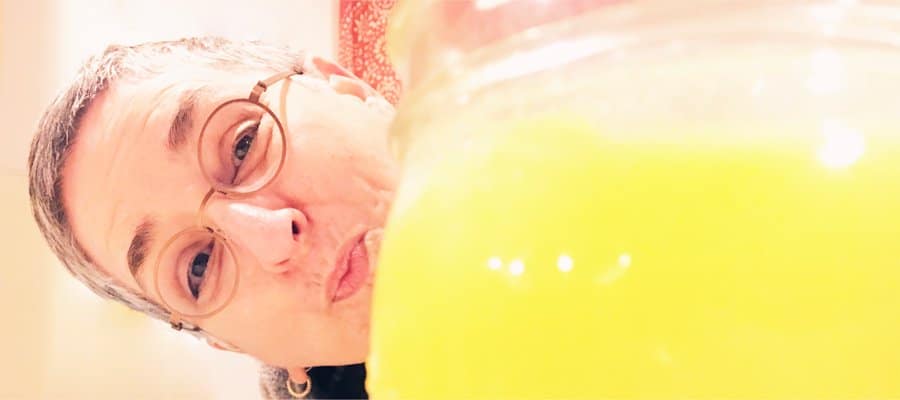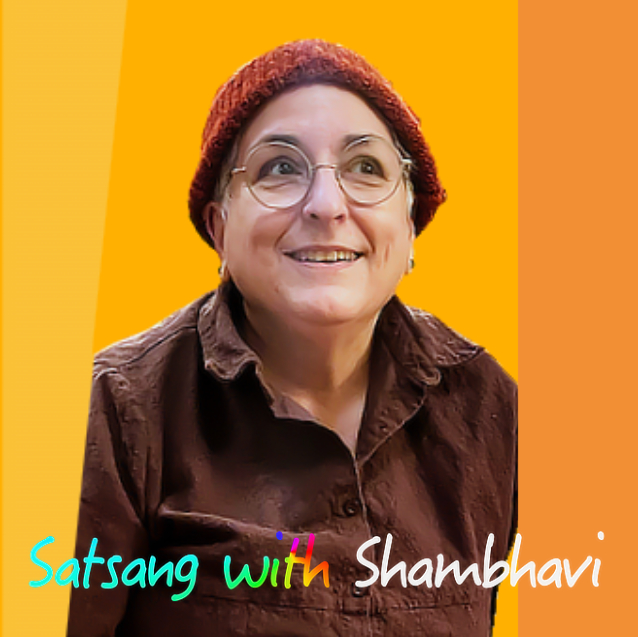Direct realization is a practice of discovering profound naturalness, or resting in your real nature. What does this mean? A podcast from Satsang with Shambhavi
SHAMBHAVI
In the two traditions that I've mainly studied in (Trika Shaivism from North India and the Dzogchen tradition of Tibet), the masters of the tradition and the texts—the scriptures—are always talking about something called your real nature.
It's probably the most common phrase in the traditions—your real nature. That you are trying to discover your real nature, that you are trying to embody your real nature.
And [pauses] it means the same thing in both of the traditions.
It means that which is indestructible, alive, self aware, and has energy—some kind of creative energy—that which is without the limitations that we normally associate with human life.
And it most importantly means something that is everywhere equally.
And that we by doing the kinds of things that we do, like meditation and mantra and things like that— that we discover that real nature which has always been there and has just been obscured in some way or another.
Our real nature has many, many different names. So, one of the names of our real nature is God. And my own teacher, Anandamayi Ma, said "know yourself," meaning know your real nature, "and you will know God." Or if you know God, then you will also know your real nature.
In the Abrahamic religions, Islam and Christianity and Judaism, God is not your own self, God is not your real nature.
God is your master, God is your better, God is your superior, God is your creator. But those traditions are dualistic, and so God and all other creatures that are God's creations are separate. They're made of different stuff.
In the Dzogchen tradition, and Trika Shaivism, and a bunch of other traditions from that part of the world, there is a continuity between your real nature and whatever we would call God. They're identical.
So the other names for your real nature— God isn't the only one. So there are plenty of other names, like all the other gods in the Indian tradition and in the Tibetan tradition.
Then more sort of esoteric names such as Instant Presence, Flowing Presence, Shiva Nature, Buddha Nature, Christ Consciousness. And in Dzogchen, rigpa.
So they're just this— really a lot of names for basically what is the fundament of existence, and what everything is made out of, and what we are already continuous with at all times.
So when we're doing spiritual practice, we're not trying to create anything new. We're trying to discover something that always has been and always is our real nature.
And so that process is not creative in the sense that we're not making something new. We are actually destroying something. And what we are destroying is the obscurations that are preventing us from knowing, experiencing, embodying, and expressing the fullness of our real nature.
Those obscurations are very simple to understand, but very arduous at times to get rid of. Those obscurations are called attachments.
They're things that we are attached to, and they are usually ideas about things, habit patterns of body energy and mind, and attachments to certain forms.
So if we look at how we're all showing up right now— exactly as we are without embellishing anything or taking anything away— right now, each of us is experiencing a very small part of what it is possible to experience and express in a human body.
When we discover our real nature, we have more capacity. We are less limited.
Our senses are enhanced because they no longer are limited by certain ideas about our senses. And we have all other kinds of capacities for joy, and empathy, and compassion, and creativity, and intelligence, and insight, and spontaneity.
Many, many what we call wisdom virtues... we— our capacities to express those and experience those is greatly enhanced when we are less limited by our attachments.
These attachments come in the form of, first of all, how we think we are. What we think a human being is, what we believe a human being is capable of. What we think we are capable of or not capable of. How we approach our relationships. How we approach our minute to minute way of living. What sort of concepts and convictions inform how we live minute to minute.
And even our form of embodiment is part of that—what we call karmic vision, that is basically tantamount to a set of limiting conditions. When we do whatever spiritual practice we do, we start to destroy or let go of our conceptual received way of being in the world.
And we start to live in a more spontaneous way that is simply meeting reality as it is showing up without so much conditioning and preconception.
And when that happens, we naturally discover a whole range of capacities and expressiveness that we didn't know that we had before.
So this is the point of what we're doing. [laughs]
And there's really nothing wrong with the limitations that we have. They are not problems, they're not psychological faults, they're not sins, they're not errors, they're not mistakes, they're not even deficits.
Because in both of these traditions that I've studied in, the essence of your real nature—aka God, aka rigpa, aka Shiva nature, flowing presence, et cetera, et cetera—the essence of that is expressivity, creative expressivity.
And so when we are destroying these attachments, what we are doing is we are releasing ourselves into the vastness of spontaneous creative expression.
And we have to realize that we ourselves are products of that creative expression. Our very limitations that we're experiencing are aspects of the creative expression of this intelligent, alive, aware, reality.
So I like to use the example of this cup to explain what conditioning means, and why conditioning is just another word for creative expression. We often bemoan that we're limited, and our feeling of being restrained is what comes about naturally.
When we start to have feelings like, there must be more than this, I feel so constrained. I want more. I want to express myself more. I want to find out what's really here. I'm tired of my same old, same old. Please, help me! Someone give me something to do to get out of the situation. [laughs]
That very feeling of urgency and constraint that we have is part of the engine of what we call liberation, or waking up.
But nonetheless, the whole package, even the ways that we're limited and the things that we balk against are all part of that creative expression. So this cup, for instance—when this cup was just a lump of clay, it was less conditioned than it is now.
So that lump of clay could have become many, many different things. Inherent in that clay was the potential to become a plate. Or a pot. Or a vase. Or any number of things that you can make out of a lump of clay.
Once, some creative person, or machine, fashioned this cup (it came from Ikea, so I doubt a person actually made it). But anyway, nonetheless, once it becomes in the form of this cup, it's more limited. It has less expressive potential.
It can no longer be a plate. It's constrained to be this cup. However we enjoy— or I like the form and the color of this cup. I bought it, I enjoy it, and I'm enjoying it as some sort of form of aesthetic production. And I probably wouldn't have enjoyed a lump of clay as much [laughs] unless I were a potter. Maybe then a lump of clay would be even better.
However, we're all that— we are all constrained forms that are arising naturally from this very creative reality and built into us is at some point the feeling that we want to be less constrained. That we want to sort of travel back to a less conditioned state and become the creator rather than just the created.
Or as one of the founders of my Indian tradition said, you want to become the player rather than the played.
The reason why we suffer is because we feel that all of these limitations that we have are very important and very real. When actually they are just part of the game of discovering that feeling of constraint, and then discovering a way to rid yourself of that constraint.
And going through the process of—you know, really wondrous process of discovering who you really are and that you have just much, much, much more capacity than you think you do at this moment.
One of the things that struck me in the short time that I've been teaching is that people have a limited idea of themselves, but then they also have a limited concept of self-realization.
You have— many people have certain ideas that they come into a particular tradition or practice with. Of what they want out of it. And what it's for. And how they're going to end up if they do that practice, or study with some particular teacher.
And it's so much less than what's actually going to happen if they follow it through to the end.
Spiritual life is full of surprises, if you are consistently going along year after year you will be surprised over and over again. It will always outrun and overflow any idea that you had about it.
And also confound you. Because it will also conflict with your overblown ideas of how practice is minute to minute. That often happens in the beginning.
Some of spiritual life is just a slog. And there's no way around that. However you really can not capture, from the position of someone who has not gotten the fruit of the practice yet, you can not capture with your concepts and ideas about things what it is actually like when you get those fruits.
You really can only understand that by walking the various paths that we have. So, the good news is that everything that we're experiencing is part of this grand play of discovering our real nature. And that our real nature is the most engaging, wondrous discovery that any person can make.
It's the greatest adventure that you can have in a human life by far. And the desire to do it is built into every single person. It's just a matter of when and how someone is going to discover that desire more consciously.
Many, many, many, many people have this sort of weird feeling. Like, I just know there's more than this. And that feeling however it expresses— maybe they just get a bigger house or whatever they do. [laughter]
But eventually, in whatever lifetime, they're going to finally figure out that it isn't really about the bigger house. And that it's about this adventure of discovering who you really are.
And you can see that that desire just permeates everything about human life. And expresses itself in infinite ways. But it really all eventually leads to the same place. And that is discovering this indestructible fundament of reality that we are actually part of. And can participate in with awareness.
Sign up to receive email updates
Enter your name and email address below and I'll send you periodic updates about the podcast.


